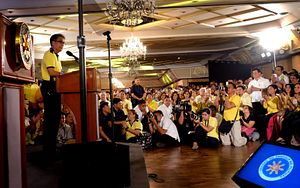On May 9, the Philippines will hold its presidential election. Philippine presidents are limited to one, six-year term, which makes them powerful and weak at the same time. They enjoy a long term in office, removing them from the regular grind of campaigning that is common in many other democracies. But, as soon as they are inaugurated, they become a kind of lame duck.
Under President Benigno Aquino III, the Philippines has reached a plateau of economic and political stability not seen since the presidency of Fidel Ramos nearly two decades ago. Aquino has made significant inroads into fighting corruption, has overseen an economy that has become one of the fastest-growing in East Asia and drawn increasing levels of interest from foreign investors, has pushed through population planning programs (the country has one of the highest fertility rates in Asia), and has inked a framework agreement for a permanent peace deal in the southern Philippines.
A peace deal could transform the southern part of the country, even though the Philippines’ legislature has failed to pass the Basic Law that, under the proposed deal, is supposed to govern parts of the south. If the southern Philippines achieved peace, the region could become an agricultural and manufacturing powerhouse.
How would Aquino’s potential successors handle the country’s still-significant challenges, including the need to rebuild Mindanao and implement the southern peace deal, the continuing battle against political corruption, the looming confrontations with China in the South China Sea, the need to upgrade the country’s deteriorating physical infrastructure, and the need to combat the still-dangerous threat of Islamic militants, some of whom now are pledging their allegiance to the Islamic State?
Mar Roxas, Aquino’s choice and a man who has held many positions in the executive branch, would likely oversee a smooth transition from the Aquino government, attempting to build on Aquino’s achievements. Roxas would probably try to implement the peace deal, continue the drive to make the Philippines more attractive to investment, and pursue an increasingly tough approach to the South China Sea, one that includes beefing up defense ties with not only the United States but also with Japan and other regional powers.
Senator Grace Poe has now been approved by the Philippines’ top court to contest the presidential vote. (She had previously been barred over claims that she did not fulfill the residency and citizenship requirements to run for the president.) Poe has a loyal following, and she is currently leading polls of the major candidates in the race, although she is only a percentage point or two ahead of her nearest rival, Davao major Rodrigo Duterte. She is an economic liberal who has vowed, as president, to ensure the Philippines join the Trans-Pacific Partnership and other free trade deals. She also promises to push through tax reforms and to liberalize Philippine investment laws to make it easier for foreign companies to invest in key sectors. However, Poe is a neophyte on foreign policy, and has not developed a clear stance on how the Philippines should address looming threats in the South China Sea with its need to maintain relatively warm diplomatic and economic ties with Beijing. Still, like Roxas, Poe would probably continue to push the Philippines’ South China Sea claims through a multilateral, legal framework, such as the current case being heard in the Netherlands, while also trying to modernize the Philippines’ antiquated navy and coast guard.
The other two major contenders are even bigger wildcards. The current vice president, Jejomar Binay, is running for the presidency. He does not enjoy Aquino’s support. (The vice president and president are elected separately in the Philippines and do not necessarily belong to the same party.) Binay has bashed many of the Aquino administration’s foreign policy and domestic policy achievements, and Binay promises, if elected, to work more closely with China. He has suggested that Manila and Beijing should cooperate on resource exploration in the South China Sea; as president, he might slow down the Philippines’ defense modernization and/or end the Philippines’ legal case on claims to the sea. This approach could have benefits, if it truly lowered tensions in the South China Sea, but more likely it will prod China to become even more assertive in contested waters.
In addition, Binay could be problematic for the Philippines’ economy, which could grow even faster if corruption were seriously addressed. Yet Binay has faced an extensive corruption investigation into his time as mayor of Makati, in Metro Manila. A Philippine Senate report has recommended filing criminal charges against Binay for graft. Binay would potentially have trouble delivering the message that the Philippines is committed to fighting corruption.
Duterte, the longtime, tough-guy mayor of Davao, in the southern Philippines, is the ultimate wildcard. He has essentially no foreign policy experience and no experience with national government. He achieved renown in Davao for his blunt talking and for fighting crime, earning comparisons to the “Dirty Harry” film hero, but his methods were highly controversial. Human rights groups accused him of overseeing large numbers of extrajudicial executions in Davao. Like Binay, he wants the Philippines to move closer to China, and he also has said he wants to bring some of his questionable crime-fighting strategies to the presidential palace, including ordering the killing of criminals. “When I become president, I’ll order the police and the military to find these people and kill [the criminals,]” he vowed on the campaign trail. In a country where the judiciary and the rule of law remain weak, Duterte’s promises to just kill criminals without due process, though popular on the campaign trail, are extremely worrying.
Joshua Kurlantzick is a fellow for Southeast Asia at the Council on Foreign Relations. This post appears courtesy of CFR.org.

































